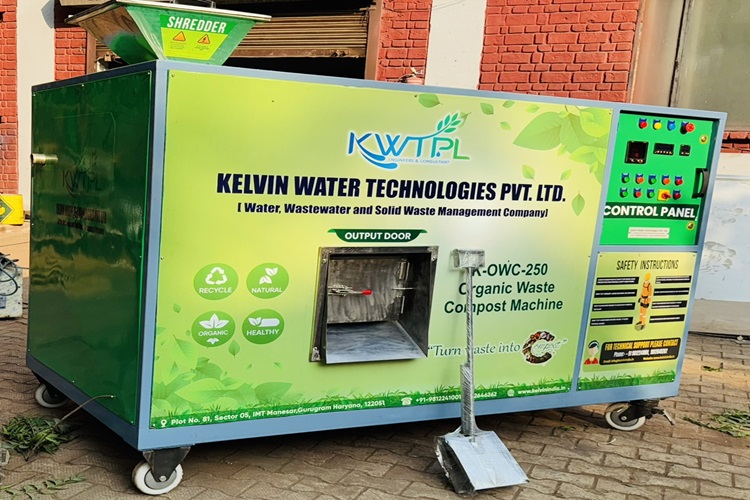Fully Automatic Composter

What is a Fully Automatic Composter?
A fully automatic composter is an innovative waste management device that converts organic waste into compost with minimal human intervention. It accelerates the decomposition process using heat, aeration, and microbial action, significantly reducing the time required for composting. Unlike traditional composting, which can take weeks or months, a fully automatic composter can process waste in as little as 24 hours.
Key Features of a Fully Automatic Composter
1. Automated Operation: Once organic waste is added, the machine takes care of the entire process, from shredding to composting, without manual intervention.
2. Temperature Control: The system maintains an optimal temperature range to speed up microbial activity, ensuring efficient decomposition.
3. Odor Control Mechanism: Advanced models come with deodorization systems to eliminate unpleasant smells, making them suitable for indoor use.
4. Shredding Mechanism: Some composters include a built-in shredder to break down large food scraps, enhancing the composting speed.
5. Moisture Regulation: The machine monitors and controls moisture levels to create ideal conditions for microbial activity.
6. Energy Efficient: Many models are designed to be energy-efficient, consuming minimal electricity while operating effectively.
7. Compact Design: Available in various sizes, fully automatic composters are ideal for households, restaurants, schools, and offices.
8. User-Friendly Interface: Most models come with digital displays and indicators, making them easy to operate and maintain.
How Does a Fully Automatic Composter Work?
The operation of a fully automatic composter involves several steps:
1. Waste Input: Organic waste, such as vegetable peels, fruit scraps, coffee grounds, eggshells, and leftover food, is added to the machine.
2. Shredding (if available): Some machines include an automatic shredder that breaks down larger waste particles, facilitating faster decomposition.
3. Microbial Action and Heat Treatment: The system uses heat and microbial cultures to accelerate the composting process, breaking down waste into organic material.
4. Moisture Regulation: The machine automatically adjusts moisture levels to prevent excess wetness or dryness.
5. Aeration System: Oxygen is circulated within the machine to promote aerobic decomposition, preventing foul odours and anaerobic fermentation.
6. Final Compost Output: Within 24 hours to a few days, the waste is converted into nutrient-rich compost, ready for use in gardens and agriculture.
Benefits of Using a Fully Automatic Composter
1. Eco-Friendly Waste Management
Automatic composters help reduce landfill waste by converting organic material into compost. This not only minimizes pollution but also contributes to a circular economy.
2. Time-Saving and Convenient
Traditional composting requires weeks or months of regular maintenance, including turning and monitoring the pile. A fully automatic composter eliminates this hassle by producing compost within a short period.
3. Odor-Free Operation
Advanced deodorization systems neutralize bad odours, making these composters ideal for residential and commercial use without causing discomfort.
4. Reduction in Waste Volume
These machines can reduce the volume of organic waste by up to 90%, helping businesses and households manage waste more efficiently.
5. Cost-Effective in the Long Run
Although the initial investment may be high, the reduction in waste disposal costs and the benefit of free, high-quality compost make these machines economically viable over time.
6. Improved Soil Health
The compost produced is rich in essential nutrients and enhances soil fertility, reducing the need for chemical fertilizers.
7. Ideal for Various Applications
From households to large-scale businesses, fully automatic composters can be used in homes, restaurants, hotels, offices, schools, and hospitals.
Applications of Fully Automatic Composter
1. Households: Ideal for managing kitchen waste efficiently and sustainably.
2. Restaurants & Cafeterias: Helps in handling large amounts of food waste, reducing disposal costs.
3. Hotels & Resorts: Enables eco-friendly waste management in hospitality industries.
4. Educational Institutions: Schools and colleges can use composters to teach students about sustainability.
5. Hospitals & Healthcare Facilities: Manages biodegradable waste in an environmentally responsible manner.
6. Corporate Offices: Encourages green initiatives in workplaces by composting office food waste.
7. Municipal Waste Management: Cities and towns can install large-scale composters to manage organic waste effectively.
Factors to Consider When Buying a Fully Automatic Composter
Before purchasing a fully automatic composter, consider the following factors:
- Capacity: Choose a model based on the amount of waste generated daily.
- Power Consumption: opt for an energy-efficient model to reduce electricity costs.
- Size & Space Availability: Ensure that the machine fits within the available space.
- Odor Control Features: Look for models with advanced deodorization technology.
- Ease of Use & Maintenance: User-friendly interfaces and minimal maintenance requirements make operation seamless.
- Warranty & After-Sales Service: Check for manufacturer warranty and support services.
Future of Fully Automatic Composting Technology
As technology advances, fully automatic composters are expected to become more efficient, affordable, and accessible. Future innovations may include:
- AI-Based Composting Systems: Smart sensors and artificial intelligence can further optimize the composting process.
- Solar-Powered Models: Energy-efficient designs powered by renewable energy will make composting more sustainable.
- Integration with Waste Management Apps: IoT-enabled composters may allow users to monitor and control operations remotely.
- Compact and Affordable Models: As demand grows, manufacturers may develop cost-effective options for small households and apartments.
Conclusion
A fully automatic composter is an excellent solution for managing organic waste efficiently and sustainably. With its automated operation, odour-free mechanism, and rapid composting process, it provides an ideal alternative to traditional composting methods. While the initial investment may be high, the long-term benefits, including waste reduction, cost savings, and improved soil health, make it a worthwhile choice. As technology advances, these composters will become even more sophisticated, making sustainable waste management accessible to more people and industries worldwide.
| To use our services right now, you can call us at +91-9812241001 or send us an email at info@kelvinindia.in We will be delighted to assist you! |